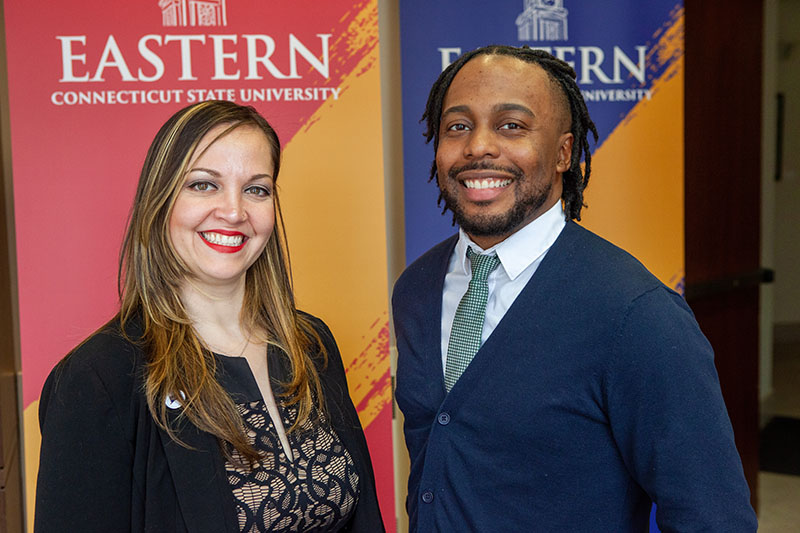- Apply
- Visit
- Request Info
- Give
Eastern sends 2 to select institute for aspiring college executives
Written by Lucinda Weiss
Published on March 22, 2023

Two staff members at Eastern Connecticut State University who work closely with students were selected to attend the yearlong Executive Leadership Institute at Bridgewater State University in Massachusetts starting in June. Christina Irizarry, assistant director of opportunity programs in the Academic Success Center, and Joshua K. Sumrell, coordinator of the Intercultural Center, will learn leadership skills in a program designed to cultivate future college deans, provosts and presidents.
Each will have a professional coach and will develop a plan of action for professional development. A key part of the plan will be regular interaction with senior leaders at Eastern and other institutions.
Both were nominated by President Elsa Núñez, who is a mentor in the program, and Vice President for Equity and Diversity LaMar E. Coleman.
They will remain in their current jobs while they participate in the institute, which has both in-person and virtual sessions. This year’s institute will have about 30 participants.
Irizarry, who joined Eastern last July, oversees Eastern’s STEP-CAP program, which helps high school graduates from underserved communities transition to Eastern through a six-week summer preparation. She also works on the DC-CAP program to recruit high school students from Washington, D.C. to Eastern, the Dream.US program for undocumented students and the international student program.
“My life’s work has always been on student access,” said Irizarry, herself a first-generation college graduate. After graduating from East Hartford High School, she earned a bachelor’s degree from Assumption College and a master’s in social work from Springfield College. She was a social worker in Connecticut and later earned her doctorate in education from the University of Connecticut, where she went on to work in college access programs.
She is president of CALAHE, the Connecticut Association of Latinos in Higher Education, the only such organization in New England. It provides 26 college scholarships to students every year and programs for faculty and staff.
“I’m living proof – you can do it,” she tells students. Her own high school counselor at first refused to sign her college applications, telling her that she would not succeed.
In the Bridgewater leadership program, she is interested in learning about models that could be implemented here to help students succeed and graduate in four years. She is also interested in what role study abroad plays for first-generation students and in post-COVID mental health support for students.
“I always tell my students, once you figure out what you love, school doesn’t feel like school,” she said. “I just love coming into new challenges and helping our students succeed.”
Sumrell has been in his current job at the Intercultural Center for just three semesters, working to build diversity and inclusiveness on campus. Last fall he won the 2022 Education Leadership Award from Prospanica Connecticut, an organization that advocates for Hispanic business professionals and raises scholarships for graduate education. He has helped Prospanica connect with Eastern’s Student Involvement Fair to promote career opportunities.
Previously he worked in student activities for four years and as a residence hall director for three years. He earned his bachelor’s degree in geography and master’s in environmental education from Southern Connecticut State University.
He worked as a resident assistant at Southern and “got a bug for higher education,” he said
“I’ve always leaned toward helping students,” he said. “I like to hear about student problems and encourage them to come up with solutions.” Besides student engagement, he’s interested in working at the institute on diversity and student mental health.
When he used to work in residence halls, alcohol was more of an issue. Since COVID, the biggest problems students face are mental health and connectedness, he said. In the leadership program, he hopes to learn tools and tips to help students deal with them.
“We’ve identified a problem, and we need solutions,” he said.


